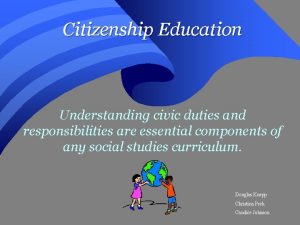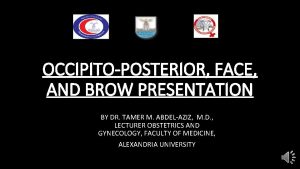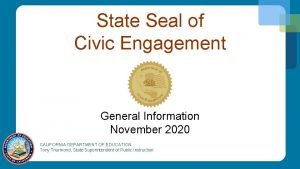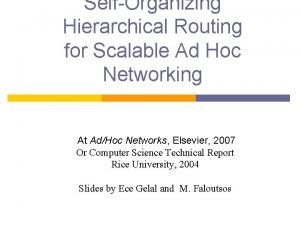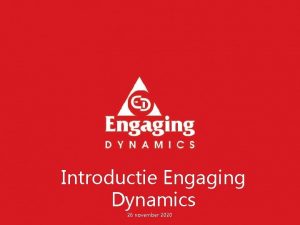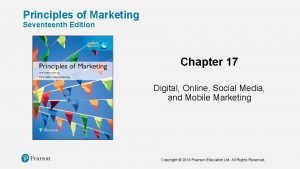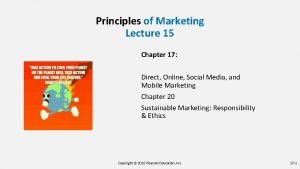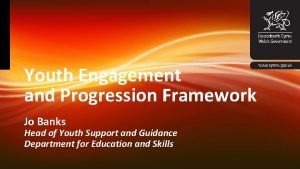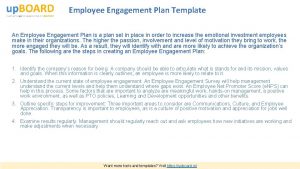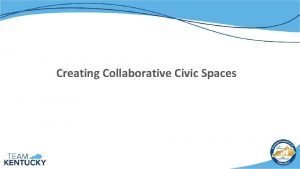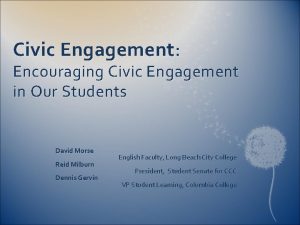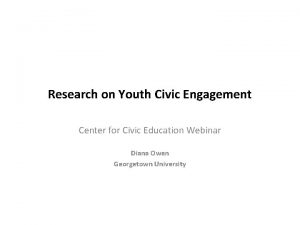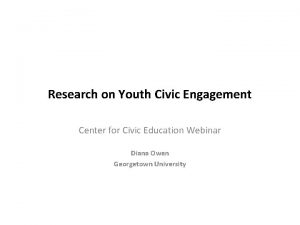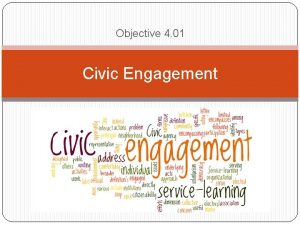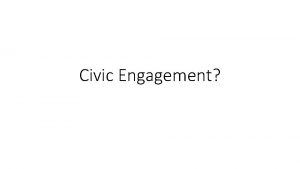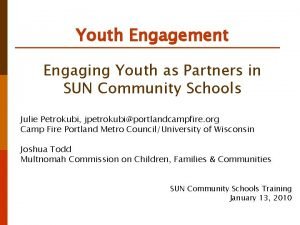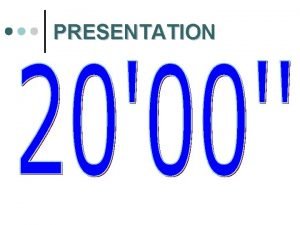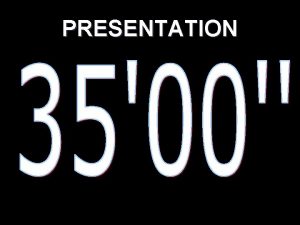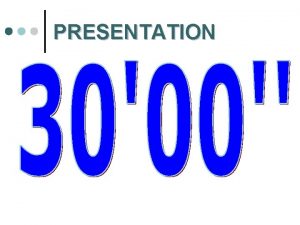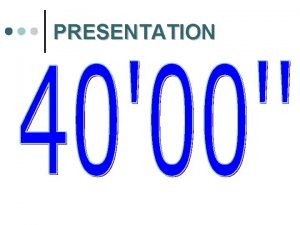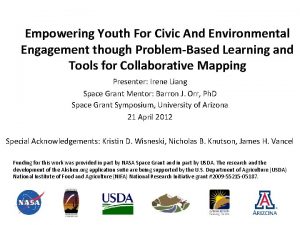Engaging Youth in Civic Engagement INFORMATION PRESENTATION Addressing















- Slides: 15

Engaging Youth in Civic Engagement INFORMATION PRESENTATION

Addressing Civic Engagement ▪ Our Research Suggests: ▪ Youth often feel that they cannot make lasting impacts within their communities. ▪ Youth sometimes believe “Voting” is the only way to participate democratically. ▪ A gap often exists between skill development and community engagement opportunities. ▪ Youth usually have the drive and passion to participate but sometimes lack the foresight and experience to seek out the proper channels.

Program Overview Munici. Politics approaches civic learning through aspiring to achieve three goals. We engage students by encouraging them to ask questions about their communities, by fostering specific skills related to participation and civic engagement, and by providing them with access to local resources as well as networking opportunities throughout the program and at our final capstone events.

Program Overview Engagement (Modules 1 & 2) ▪ The initial two modules are designed to develop students’ understandings of the civic landscape. Using political inquiry, we foster students’ grasp of the various levels of government with emphasis on the municipal. Students are challenged to consider how their choices impact their communities. Through a greater civic awareness, students will be encouraged to ask themselves how they can make a difference in the city of London Ontario, and beyond. Methodology (Modules 3 & 4) ▪ The last two modules are designed to develop students’ understandings of civic action. Using the existing political processes within London, we explore the meanings of citizenship to youth and how citizenship manifests as activity. Too often engagement is encouraged without reflection. Both the effectiveness and efficiency of civic actions and their methodologies will be investigated to provide students with the tools to critically engage in civic activity.

Module One ▪ What does it mean to engage in your community and what does it mean to participate democratically? ▪ This module focuses on some of the different forms of citizenship and their associated values and forms of civic action. ▪ In accordance with strand B and strand C of the 2013 Ministry curriculum documents, this module will foster students’ awareness of the beliefs and values associated with democratic citizenship and begin to explore how these beliefs and values effect civic action and one’s position on civic issues in London and beyond. Further, this lesson attempts to draw different ideas and perspectives on citizenship together in order to demonstrate that everyone can contribute to the common good.

Module Two ▪ Module 2 provides students with the opportunity to evaluate different forms of volunteerism. Lessons in module 2 attempt to foster students’ ties with the London Community so that students can transition into areas they are concerned about. ▪ This module focuses on the contributions of individuals to the common good and figuring out how we can each make such contributions in our day-to-day lives. ▪ In accordance with the strand C of the 2013 Ministry curriculum documents, this lesson helps students analyse a variety of civic contributions and ways in which people can contribute to the common good.

Module Three ▪ This module investigates the political process in London and how youth can become involved in this process through the London Youth Advisory Council. Its lessons explore civic mobilization through participation. ▪ This module offers a mini-conference with LYAC councillors in which students will be encouraged and supported to explore and evaluate current major civic issues in London. ▪ In accordance with the strand B and C of the 2013 Ministry curriculum documents, lessons within module 3 stimulate students’ inquiry into a range of issues of civic importance, especially the roles and responsibilities of related figures, structures, and institutions in Canadian governance to particular issues. Further, incorporating Strand C, these lessons provide students with the opportunity to develop a plan of action to address a civic issue of personal interest.

Module Four ▪ ▪ ▪ This module introduces students to the existing and potential outlets with which to create change as well as methods by with which to influence and affect collective action. Also, this module stimulates students to think critically about, and assess, the efficiency and effectiveness of various methods of civic activity. This module attempts to connect students with local initiatives to help foster their advocacy. This module offers lessons on advocacy and social movements. Its lessons invite students to collaborate with their peers in discussions about civic activity, especially the structure, resources, management, and overall efficiency and effectiveness of civic initiatives. In accordance with the strand B and C of the 2013 Ministry curriculum documents, module 4 revisits the beliefs and values associated with democratic citizenship in Canada, especially how they relate to individuals’ positions on civic issues. These modules go into greater depth exploring various civic contributions, and how they further the common good.

Conference: Capstone Event Networking Lesson ▪ The Capstone Conference provides a venue for students to bridge their in-class learning with civic and volunteer initiatives in London community. Municipolitics gives students the opportunity to meet representatives from different organizations and students who are currently involved in a multitude of activities so that they may leave the Capstone Conference with ideas about how to move forward with their particular interests. ▪ One Hour Networking Lesson directly paired with interactions amongst 25 different organizations across the city. Lunch will be provided. ▪ Open to all grade 10 civics students in our program, as well as any student wishing to participate. Budget Workshop ▪ www. buildabudget. ca ▪ Workshop designed by Finance and Corporate Services of the City of London. ▪ Budget workshop is designed to teach students the basic mechanisms inherent when budgeting at the Municipal level. ▪ The workshop will reflect the current 2014 budget, in which students will have the opportunity to balance the budget, as well as discuss the potential outcomes vs. what has been passed by council as of February, 2014.

Teaching Strategies ▪ Our instructors come from Western University as either undergraduates or recent graduates. While developing our instructor training program we trained five instructors in how to effectively facilitate our lessons. ▪ Our organizational pedagogy consists of three elements: participation, inquiry, and praxis. ▪ We employ differentiated alternatives in instruction in our formal lessons and so they can be modified to accommodate wide ranges of learners, although most of our lessons are predominantly dialogical.

Instructor Training: Overview ▪ Pre-session: Introductions (30 minutes) Ice-breaker: Matrix ▪ Session 1: 1) Dialogue about dialogue (25 - 30 minutes) - Reflection 2) Let’s talk Methods (75 minutes) 3) Micro-teaches - Responsible Citizen - Participatory Citizen - Social Justice-Oriented Citizen - Volunteerism - Community Involvement - Passion/Spark ▪ Session 2: 1) Mock Module 1 or 2: (75 minutes) 2) Heuristics & Responsive versus Restrictive Language (45 minutes) 3) Introduction to the Theatre of the Oppressed (1 hour) 4) Debrief

Online Platform

Data Collection ▪ We are hoping to poll students’ opinions. Our intention is to accumulate data regarding youth civic engagement in London to both improve the quality of our programming but also to provide the views of students about local issues to stakeholders including city councillors. ▪ Partnership with the London Youth Advisory Council – to provide information on issues that affect youth between 15 – 25 for the benefit of legitimate student representation.

Outcomes of the Program ▪ Increased levels of understanding of the municipal framework in London, Ontario. ▪ Increased levels of community involvement, volunteering opportunities, and resources. ▪ Over 200 students participating in Municipolitics Conference: Capstone event (4 hours of volunteering for attending – professional development tool). ▪ Data collection for youth councils and for qualitative analysis of program productivity.

Conclusions ▪ Thank You! ▪ Questions ▪ How can we develop our lessons better? ▫ Municipolitics would like high school teachers to consistently offer us feedback /assist in the development of our teaching strategies
 Civic citizen
Civic citizen Differences between duties and responsibilities
Differences between duties and responsibilities Fundal level
Fundal level California state seal of civic engagement
California state seal of civic engagement Civic engagement meaning
Civic engagement meaning Flat addressing vs hierarchical addressing
Flat addressing vs hierarchical addressing Dynamisch verbinden
Dynamisch verbinden Marketing involve engaging directly with carefully targeted
Marketing involve engaging directly with carefully targeted Marketing involve engaging directly with carefully targeted
Marketing involve engaging directly with carefully targeted Youth engagement and progression framework
Youth engagement and progression framework Employee engagement survey action plan ppt
Employee engagement survey action plan ppt Employee engagement plan sample
Employee engagement plan sample Student engagement presentation
Student engagement presentation The civic mirror
The civic mirror Civic space collaborative
Civic space collaborative Civic mirror hidden agenda
Civic mirror hidden agenda
